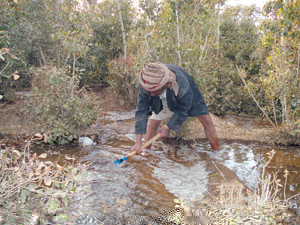
Tarim operation death toll increases, Yemeni-Saudi contacts to face Al-Qaeda [Archives:2008/1181/Front Page]
August 14 2008
 |
For the Yemen Times
SAYOUN Aug. 13 ) The Ministry of Interior declared last Tuesday that it had killed the Al-Qaeda leader Hamza Al-Kuwaiti along with four others in a “qualitative security operation” in Tarim region of the Hadhramout governorate. The operation also resulted in the death of three soldiers.
A security source said that Al-Kuwaiti and four other Al-Qaeda followers were killed in armed confrontations between Al-Qaeda and security forces that broke into a house suspected of sheltering a cell affiliated with Al-Qaeda Organization Jihad in the Arabian Peninsula group in Tarim city.
Al-Kuwaiti, one of the 23 Al-Qaeda followers who fled the political security jail in Sana'a in February 2006, threatened last week to execute “larger armed attacks” in Yemen unless the government releases Al-Qaeda members detained in the Yemeni prisons.
With the death of Al-Kuwaiti, a 38 year-old Hadramout resident, the death toll among the 23 Al-Qaeda members who fled prison in 2006 increased to four. Security forces killed Fawaz Al-Rabi'ie and Mohammed Al-Dailami in Sana'a in October 2006 and Yasser Al-Humaiqani in Abyan governorate in January 2007.
The same security source declared that the operation resulted in the death of three security men including an officer, in addition to two others injured, one of whom was the prominent figure in Tarim's Central Security named Colonel Saleh Al-Khayyati. He also said that security forces arrested two men affiliated with the cell.
The source maintained that security forces also found weapons, ammunition, shells, explosives and a computer belonging to the Al-Qaeda cell in addition to passports issued from other Arab countries. Among these passports was one with the name Ahmed Omar Saeed Al-Mashjaain, the man who executed the suicide attack that targeted a security residence in Sayoun in July.
Hadhramout governor Salim Al-Khanbashi told the Yemen Times that the armed group “consisted of seven persons suspected of being involved in the Sayoun suicide attack.” “The armed group, entrenched inside the house situated near the Dar Al-Mustafa Corporation, which is in charge of teaching Islamic education, opened fired on the security men,” he added.
Al-Khanbashi said that the initial clashes between the armed men and security forces resulted in the death of two security men and an element from the armed group before the security men surrounded the house for around eight hours. The operation ended with three men from the armed group dead and two arrested after they were injured during the clashes.
Security and diplomatic procedures to face al-Qaeda
Only 24 hours after the armed clashes, the state-run Saba News Agency reported that Vice-President Abdurabbu Mansoor Hadi arrived in Sayoun city “on a visit to consider the progress of the oil and gas companies working in Hadramout.”
While Saba reported that the vice president will meet with the governorate's leadership during his visit, observers felt that the sudden visit Hadi paid to Hadhramout was really to follow up on the progress of the security plan Al-Khanbashi declared last week, particularly given that Hadramout has witnessed a notable increase in activity from local Al-Qaeda cells.
President Ali Abdullah Saleh spoke with Saudi Prince Abdullah Bin Abdul Aziz yesterday evening to discuss the results of the Tarim security operation that targeted the Al-Qaeda cell. During the talk, Saleh informed the Saudi prince of serious information regarding Al-Qaeda plans to target Yemen and Saudi Arabia with terrorist acts, according to Saba.
An Al-Qaeda leader in the Arabian Peninsula called his followers to leave Saudi Arabia for Yemen to avoid being arrested by the Saudi authorities this past May. Leader of Al-Qaeda in Saudi Arabia, Nayif Al-Qahtani, considered that his organization lost the battle with the Saudi Security Forces, and called the group's leaders to leave Saudi Arabia and head to Yemen, according to the online Al-Qaeda-affiliated Sada Al-Malahim Magazine.
Al-Qahtani maintained that the organization aims to “hinder the oil supplies from the region” through its work in Yemen.
The Yemeni authorities accused Al-Qahtani of supplying the explosives for two suicide attacks that targeted Marib and Hadramout oil constructions in September 2006.
——
[archive-e:1181-v:16-y:2008-d:2008-08-14-p:front]


